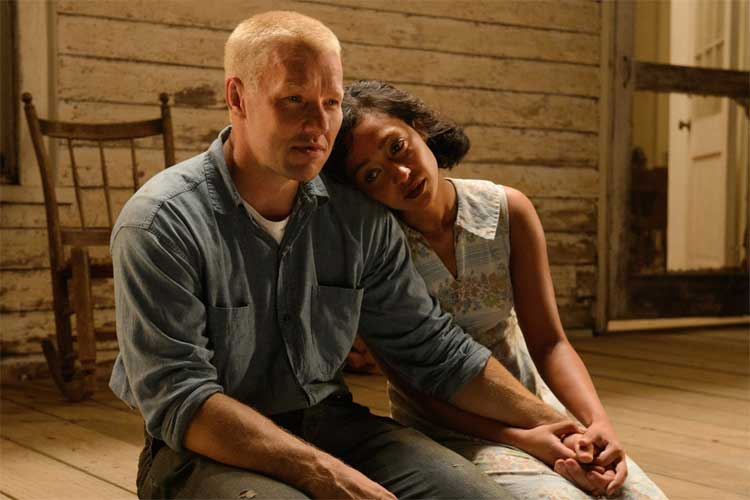The following questions and answers are excerpted from a conversation that followed the NBR screening of Loving.
What was the research process like, preparing to play such a quiet man with such a strong presence?
Joel Edgerton: For Ruth and I, the documentary became a road map for us to think about the way we needed to look and how we needed to carry ourselves. But there is something else beyond that, being in Virginia and actually doing brick laying. Beyond finding the clues in the documentary, we had to create a relationship over the two separate characters. Much of the crafting that relationship goes back to Jeff’s screenplay in the observance of silence. The relationship was well lived in silence, which is interesting because normally we assume you’d live in speeches in a typical relationship.
“I wanted to see around the edges of the archival footage and be in their day-to-day lives”
The producers of the film have said that your first draft of the script was close to what you ended up shooting. What was your process for adapting this story?
Jeff Nichols: That speaks to the level of support I got from the producers and the clarity of the story. When I first watched Nancy Buirski’s documentary and spoke to the producers, I said to them that there is a version of this story that is pretty feel good and exuberant and that I wasn’t interested in that story. I knew that I wanted to make something very quiet because I wanted to attach this to their point of view. I wanted to see around the edges of the archival footage and be in their day-to-day lives. As beautiful as the oral arguments are in court and as important as Loving v. Virginia is, the real statement they made was living together and continuing to live together. The thing that people didn’t like about Richard and Mildred is that they existed at all. And the way that you counter someone who is attacking your existence is to just continue living, so it made sense to focus on the day to day. Luckily, I turned that screenplay in and the producers felt that was representative of the story.
Can you talk about the motivations of your character and bringing comic relief to the film?
Nick Kroll: I think there a lot of people who pretend to be someone in a job and their motivations are not wrong, but they are pretending to be someone with more credits or a better resume. Sort of ‘fake it ‘till you make it,’ which is what Bernie does. He wants to help these two people, but he doesn’t have a ton of experience. I think what Jeff has done in writing and directing this movie is he’s shown everyone’s humanity.
Nichols: Nick resembles Bernie in an uncanny way.
Kroll: He was a very handsome guy.
Nichols: There’s all this footage of him in the documentary and it’s like watching “The Office” or something. He’s aware that he’s on camera. It’s funny seeing his eyes dart to the lens to make sure a moment is captured. I always felt that there’s a performance with Bernie playing the capable attorney in the documentary. Nick does a great job modulating this performance within a performance.
The situational humor comes from the contrast between Mr. Cohen and Richard because they seem to be on such opposite sides of the spectrum. Can you talk about shooting the scene with the three of you in the lawyer’s office with Mr. Cohen?
Kroll: I think in that scene I have more lines than Richard has in the entire film.
Edgerton: I love it when you have a scene or dramatic situation where everyone’s different point of view is valid. This scene says a lot about the struggles on inequality where people who want to live quietly are dragged out of their homes to argue their case. In the lawyer’s office, it makes sense what Richard is saying to do away with everything and promise not to hurt anyone. In the world we live in, that’s not possible and there’s a lot of red tape you have to go through to get to that simplicity.
Ruth Negga: These scenes are brilliant because they chart this couple’s learning of what and who they are up against. It was important for us to show the audience those quiet moments of absolute devastation. You see this couple in what they’re going through and they have no idea what they’re up against.

